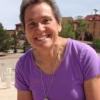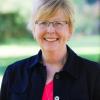Most cancer survivors will admit that they never quite stop looking over their shoulders to see if a recurrence is creeping up on them. Having been caught by surprise once, nobody wants to be blind-sided again. My initial experience of ovarian cancer came in February 2008 when I was 52 years old, a Sister of Charity of Cincinnati practicing family medicine at the U.S.-Mexico border near El Paso, Texas.
Three Stats and a Map - The conflict in Syria has resulted in millions of Syrians fleeing the country, seeking refuge elsewhere, while millions more are internally displaced. Where are they finding welcome?
"The Universe story needs to be accepted simultaneously as the human story and the story of every being in the Universe."
We don’t always know who we’re going to encounter on the Internet or in any other place where people gather. We can bump into not only the joy-filled, funny, thoughtful, and creative types, but also the surly, heart-broken, fragile, and unfriendly too! On any given day, we ourselves might be any or many of these. What can we do to bring our best selves to our online encounters with others? How can we extend hospitality online?
"We fail to see that some are mired in desperate and degrading poverty, with no way out, while others have not the faintest idea of what to do with their possessions, vainly showing off their supposed superiority and leaving behind them so much waste which, if it were the case everywhere, would destroy the planet."
Sacred Heart Sr. Florence de la Villeon and nine other sisters are training to minister to refugees in Sicily, Italy, attending to people's spiritual needs and helping to build bridges between the refugees and the Sicilian population.
"When the harvest is plenty, why are so many people left hungry?"
NCR Preview - Women play a key role in helping to fulfill Pope Francis' message of mercy, service and compassion, three women leaders of the largest Catholic social service organizations said in a panel discussion at Georgetown University on Oct. 22.
NCR Preview - The leader of the umbrella group for some 600,000 global Catholic women religious has said that in the wake of this month's Synod of Bishops the women are called to carry forth the pastoral work that the official church is sometimes not able to do. Sr. Carmen Sammut — who participated in the Oct. 4-25 Synod as one of 32 women who took part in non-voting roles alongside the 270 prelate-members — said the women religious should engage with people church institutions may not even know need help.
GSR Today - Our thoughts and prayers are with the people of Mexico and others as Hurricane Patricia has passed through. And we remember the sisters who were killed 35 years ago in El Salvador and 23 years ago in Liberia.





